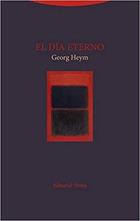
The eternal day is the first collection of Georg Heym, the only one he saw published in life, in 1911. Despite the poet's youth, it is one of the most significant productions of German Expressionism and had an important reception. Dedicated to one of the great metropolises of the moment, Berlin, it is a work in which a visionary Heym expresses ambivalent feelings towards the big city and describes breathtaking apocalyptic landscapes, revealing the parallel reality of dreams, of the incomprehensible and of death. Death, so present in its verses, is represented as an inevitable destiny, as a premonition; the premonition, even, of the poet's own death. In The Eternal Day there is an affinity between writing and painting: poetry is sustained on shuddering plastic images, but it is capable of transcending them by awakening in readers other senses, smell and hearing, thus creating impressio...read more














